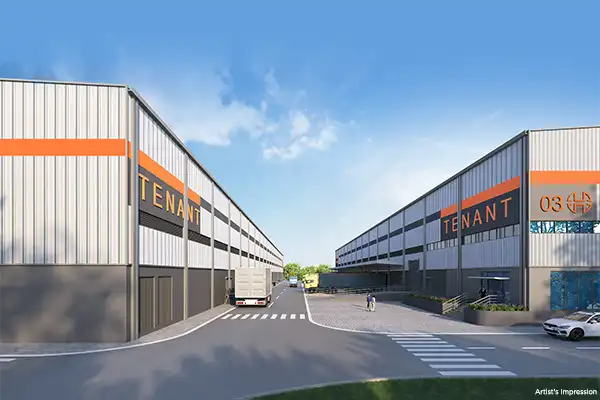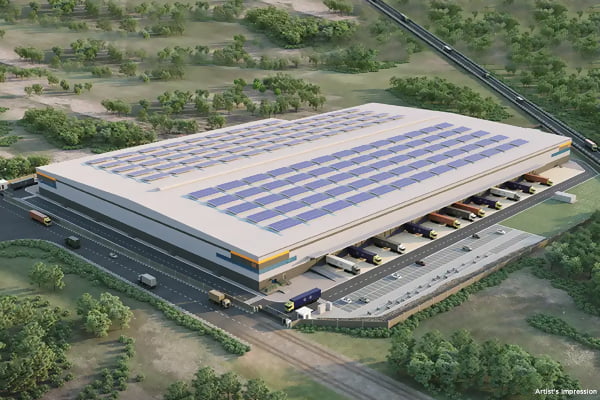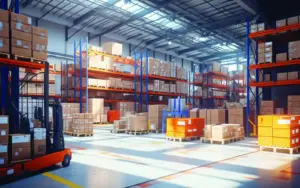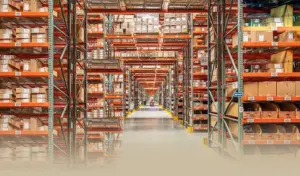Warehouse management systems are revolutionising the way businesses approach warehousing. The future of warehousing is characterised by automation, on-demand platforms, and a focus on simplifying warehouse management. This blog will explore how warehouse management systems are shaping the future of Industrial Warehousing Services and how businesses can take advantage of this technology.
Future Warehouses and Automation
Warehouse automation is a growing trend in the logistics industry. Automation can help warehouses to improve the accuracy and speed of their operations, reduce errors, and increase the safety and efficiency of warehouse operations.
According to a report by ResearchAndMarkets.com, the global warehouse automation market is expected to grow at a CAGR of 7.5% during the forecast period of 2020-2025. The increasing adoption of automation drives this warehouse growth to improve operational efficiency and reduce labour costs.
Warehouse management systems are at the forefront of this trend, providing businesses with the tools they need to automate their warehousing operations. These systems can automate inventory management, picking and packing, and shipping tasks, freeing up valuable human resources to focus on more strategic tasks. With the integration of warehouse management systems, warehouse operations can be seamlessly integrated with other systems, such as ERP and CRM systems, which help businesses to have a real-time view of inventory levels and customer demand.
On-Demand Platforms and the Future of Warehousing
The rise of e-commerce and on-demand platforms has also significantly impacted the future of warehousing. With the rise of e-commerce, businesses are facing the significant challenge of managing the increasing volume of orders, which need to be processed and delivered on time. Customers increasingly expect faster delivery times and more flexibility, so businesses are turning to warehouse management systems to help meet these demands.
Warehouse management systems can provide real-time visibility into inventory levels, enabling businesses to respond quickly to customer demand. They can also automate the process of fulfilling orders, allowing businesses to get products to customers faster than ever before. With the integration of warehouse management systems with e-commerce platforms, companies can have a seamless view of the inventory levels, and customer demand and can automatically process the orders. This helps businesses to improve their order fulfilment process and provide faster delivery times to customers.
Simplify Your Warehouse Management
Warehouse management systems can also simplify the process of managing a warehouse. These systems can provide businesses with detailed insights into their operations, enabling them to make data-driven decisions to improve efficiency and reduce costs. Businesses can use the data provided by the warehouse management systems to optimise the warehouse layout, improve the picking and packing process, and reduce inventory carrying costs.
With the integration of warehouse management systems with barcode scanning and RFID technology, companies can automate their inventory tracking process, which helps to reduce the mistakes and improve accuracy. In addition, warehouse management systems can automate many of the manual processes involved in warehouse management, such as inventory tracking and reporting. This can save businesses time and money while reducing the risk of errors.
Conclusion
Warehouse management systems are the future of warehousing. They are helping businesses automate their operations, improve their ability to respond to customer demand, and simplify managing a warehouse. As the logistics industry continues to evolve, warehouse management systems will become an increasingly important tool for businesses of all sizes. With the integration of warehouse management systems, companies can improve their operations, reduce costs, and improve customer satisfaction.
About Hiranandani National Park Warehouses
The warehousing solutions offered by Hiranandani National Park Warehouses are designed to meet the unique needs of businesses. They have a team of experienced professionals who can help enterprises to optimise their warehouse operations and provide solutions tailored to their specific needs. They also offer a range of value-added services such as inventory management, pick and pack, and cross-docking, which can help businesses to streamline their logistics operations and improve their bottom line.
In addition, Hiranandani National Park Warehouse Company in India is committed to providing the highest customer service and support. They have a dedicated customer service team available 24/7 to answer any questions and assist. Businesses can trust that their logistics needs are in good hands with Hiranandani National Park Warehouses.
In conclusion, warehouse management systems are the future of warehousing. They help businesses automate their operations, improve their ability to respond to customer demand, and simplify the warehouse management process. Businesses that want to stay ahead of the competition must adopt warehouse management systems. Hiranandani National Park Warehouses is an excellent choice for companies looking for a reliable and experienced provider of warehouse management solutions and warehousing facility in Chennai.
FAQ
1) What is the future of warehouse management?
With the rise of e-commerce, businesses are facing the significant challenge of managing the increasing volume of orders, which need to be processed and delivered on time. To meet these challenges, businesses are turning to warehouse management systems to automate their operations, improve their ability to respond to customer demand, and simplify managing a warehouse. The future of warehouse management is characterised by automation, data analysis, and integration with other systems. In addition, the use of advanced technologies such as Artificial intelligence, machine learning, and IoT will also play a vital role in the future of warehouse management by helping businesses to optimise their warehouse operations and reduce costs.
2) Why is the Warehouse Management System important?
Warehouse management systems are important for businesses because they provide real-time visibility into inventory levels, automate the process of fulfilling orders, and simplify managing a warehouse. With the integration of warehouse management systems, businesses can improve their warehouse operations, reduce costs, and improve customer satisfaction. The data provided by the warehouse management systems can be used to optimise the warehouse layout, improve the picking and packing process, and reduce inventory carrying costs. In addition, warehouse management systems can automate many of the manual functions involved in warehouse management, such as inventory tracking and reporting, which helps to reduce errors and improve accuracy.
3) What are the features of the warehouse management system?
- Inventory management: allows businesses to track inventory levels in real-time and manage inventory replenishment.
- Picking and packing: automates the process of fulfilling orders and generates pick lists
- Shipping and receiving: streamlines the process of receiving and shipping goods.
- Reporting and analytics: provide detailed insights into warehouse operations and enable businesses to make data-driven decisions.
- Barcode scanning and RFID technology integration helps businesses to automate their inventory tracking process and improve accuracy.
- Cross-docking: enables businesses to transfer goods from one mode of transportation to another with minimal handling
- Multi-location support: allows businesses to manage multiple warehouse locations from a single system.
















